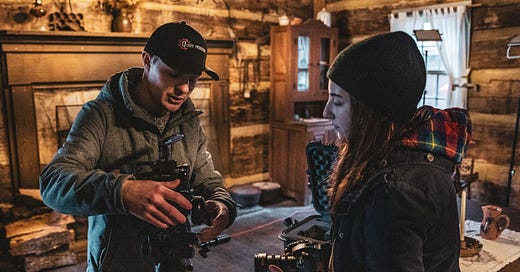Indy Film Fest: Cold Cross filmmaker Dylan Query
The filmmaker talks about his neo-Western set and shot in Pike County, Indiana.
For Indy Film Fest schedule and tickets, please click here.
Film Yap: Where did the inspiration for this film come from? In some ways it’s a throwback revenge Western but uses a lot of modern techniques and mood generation.
Dylan Query: “Cold Cross” is designed as a Neo-Western, taking place in the grisly frontier rather than the wild west. While Jacob is a big fan of Westerns, I didn’t grow up enjoying them as much. Throughout this project I would have people come up to me and talk about all these classic western references, which I was wholly unaware of. While that could be considered a weakness, we considered it a strength. It allowed us to take some classic Western influences brought to the table by Jacob and blend it with my Western ignorance. The resulting film may fit into the Western genre, but we’re also so proud of its differences.
FY: Talk about the partnership with Jacob Stieneker. In addition to being your star, he co-wrote the screenplay with you, and you seem to have traded a lot of the same hats.
DQ: Jacob and I started working together in 2019 for my short film titled “RETNE.” It was Jacob’s first time on a production set and his first time acting. The experience inspired him to write “Cold Creek,” which became the pilot for the feature length version, “Cold Cross.” When Jacob came to me with this idea, I couldn’t say no. It was such a unique project and really a chance for us to stretch our wings creatively. The two years that followed will remain as one of the most special and creative collaboration projects of my life. It was so natural how easily Jacob and I could work together, collaborating on the story, costumes, casting, score, and so much more. We trusted each other enough to always listen to each other’s ideas but we also trusted each other enough to do what needed doing. We started off as friends but by the end, we became brothers.
FY: Filmmakers just starting out always want to know about the logistics of putting together a first feature film: raising money, finding a cast a crew, getting suitable locations, costumes, props, etc. What was it like for you?
DQ: So many filmmakers want to leave Indiana because of the lack of industry. I totally understand that. However, I will say that strength through adversity exists. Because it’s so hard to get started here, what you find is that the people who stay and strive to be filmmakers are incredibly talented, passionate, and great problem solvers. There may be a lack of industry here in Indiana but there’s no lack of genuine Hoosier talent. Jacob and I used our pilot short film to help raise $20,000. Since I began my production company in 2015, I either had or could easily obtain all the gear we needed to film including camera gear, lighting, audio, grip, etc. A lot of our film was shot out in the wilderness, and we were fortunate to know a lot of friends with property which we were able to use for free or rented by the day. Most of our costumes and props were purchased online, were made, or were borrowed. Finally, regarding casting, we utilized Facebook as our primary source of outreach.
FY: Why did you want to set and shoot this story in Indiana – not exactly a historic hotbed for Westerns?
DQ: Jacob and discussed this thoroughly and we decided that we really liked the “Hatfield vs. McCoys” setting and felt that setting our film during the late 1800’s in the American Frontier could still very much work in a Western. It was much easier for us to find locations and helped to differentiate our film from other Westerns settings.
FY: What would you say are the most important lessons you took away from this project as a filmmaker?
DQ: The most important lesson I took from this film… was that filmmaking CAN be done in Indiana. It’s not easy by any means but creating something from nothing should be treasured. I heard a quote the other day from another local production company (Pigasus Pictures) that “The natural state of a film is to not be made.” I could not agree more. After so many late nights I learned that no matter how tired and exhausted I became, working on “Cold Cross” was more rewarding to me than any possible late night I could work for a day job. At the end of the day, regardless of what awards we win or what distribution company picks us up, we made a film and that can never be take away from us.
FY: What’s next for you?
DQ: I’m honored to say that “Cold Cross” is currently signed by ScreenBound, an International Distribution company. We’re excited to see where this deal will lead us!




